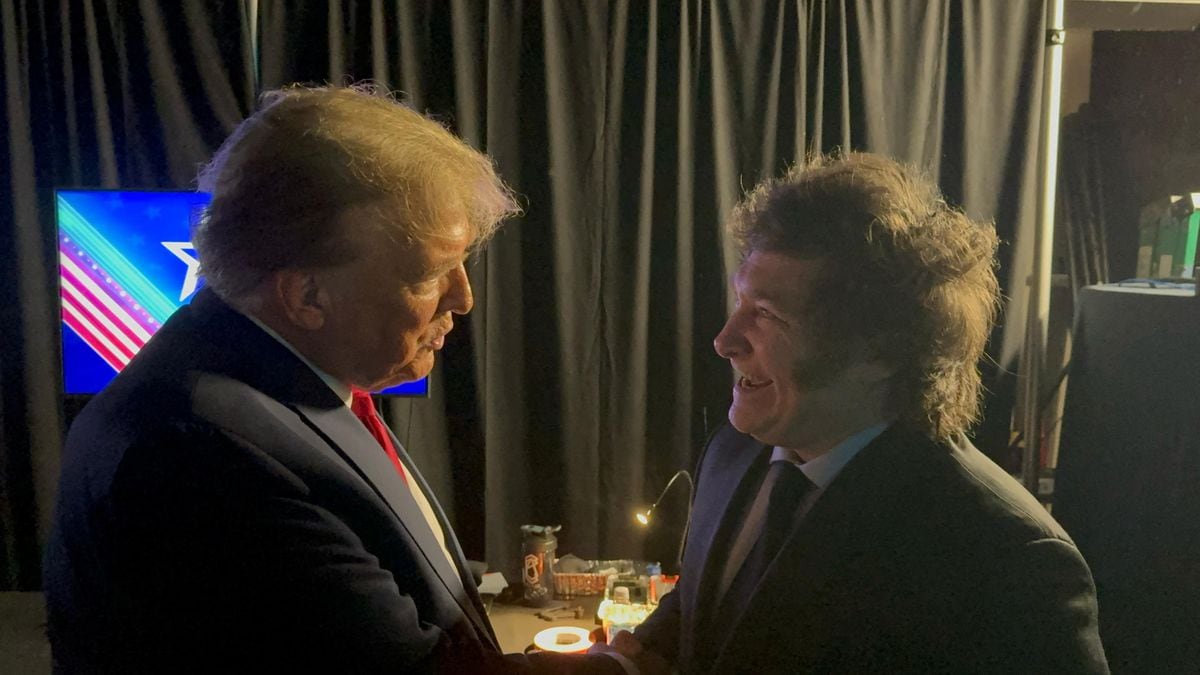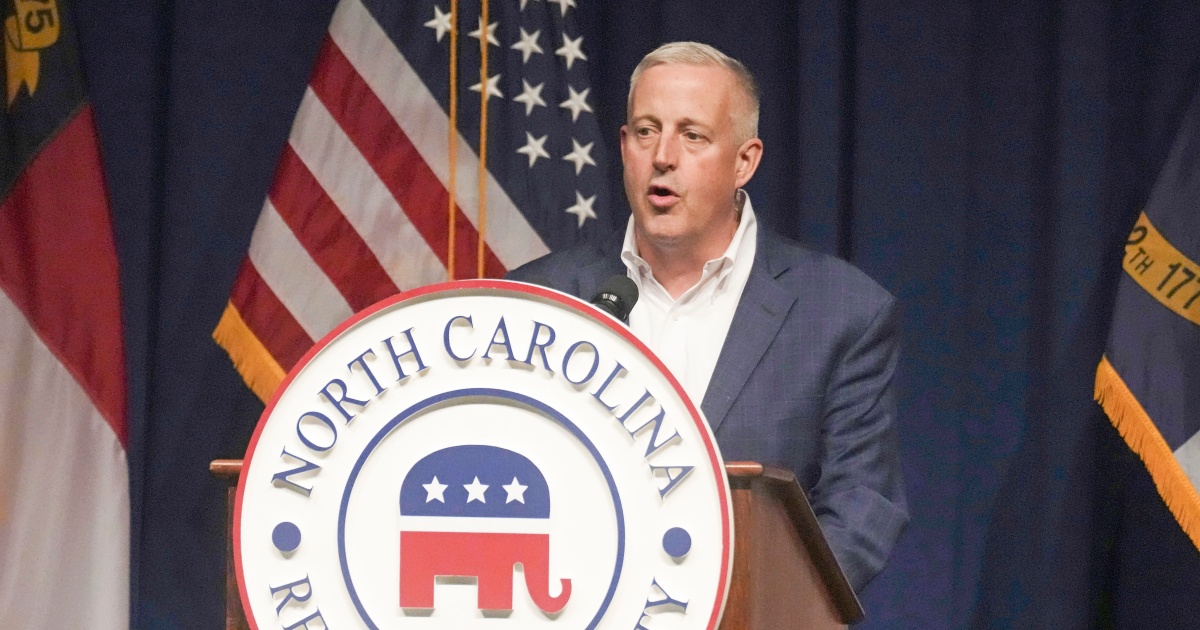The meeting between Presidents Jair Bolsonaro and Donald Trump, in March 2019.
Wong / Getty
The invasion of the Capitol, instigated by the president defeated in the last US elections, sent a warning signal to Brazil, especially after Jair Bolsonaro pointed out that the pro-Donald Trump insurgent movement could have a tropical version in two years.
"If we use electronic voting in 2022, the same will happen," the Brazilian president commented this week in a new attempt to discredit Brazil's electoral system without evidence and ask for the return of the vote in a physical ballot box.
Faced with another demonstration of appreciation for Trump's tactics by the country's highest authority, there was no shortage of repudiation notes and warnings from the Supreme Court about the state of democracy.
But the question posed by analysts, opposition parties and other politicians is another: what can be done to prevent a possible attempt to kick the institutional landscape or even rehearse a more classic coup in the next elections?
For the lawyer Pedro Abramovay, director of the Open Society in Latin America, by insisting on the theory of fraud at the polls, Bolsonaro and his supporters have planted the seed of a strategy to remain in power in case of defeat in the next elections, scheduled for 2022. “The intention is evident when Bolsonaro makes this type of demonstration.
We are talking about a president who built his political life discrediting democracy ”, explains the jurist.
In immediate response to the statements of the Brazilian president, the Superior Electoral Court (TSE) condemned the attack on the electoral system and stressed that its president, Luís Roberto Barroso, “deals with facts and evidence, which must be presented through the relevant channels ”.
Abramovay believes that, in addition to the fact that the institutions must act as a counterweight to the undemocratic declarations of the Government and Bolsonarism, it is essential that they have support in the political ecosystem.
"If the Armed Forces are not willing to comply with it, the Constitution is worth nothing," explains the lawyer.
"The Supreme Federal Court can only enforce the Constitution if there are articulated political forces powerful enough to prevent the president's coup intentions."
Remember that in countries like Hungary and Turkey, which have recently experienced the emergence of authoritarian governments, the democratic state has gradually collapsed from gradual attacks on institutions.
In a similar vein, Andrei Roman, founder of the consulting firm Atlas Político, which develops opinion polls on Bolsonaro's popularity and the preferences of his voters, sees a common factor between Brazil and authoritarian regimes that may be decisive for a hypothetical coup inclination.
"In the current context, it is increasingly difficult to identify the exact moment in which a coup d'état occurs," says the political scientist.
“The infiltration of the military in the Government occurs in Brazil in the same way that it happened with Chávez, in Venezuela, or with Orbán, in Hungary.
Having actors who share the idea of an authoritarian regime in strategic positions is even more worrying than the popularity of the president, ”he says.
Roman points out that, according to the latest Political Atlas polls, between 10% and 15% of the Brazilian population supports the seizure of power by the military, a percentage similar to that of those who support the theory of manipulation of the urns.
The index may increase, depending on the government's performance and Bolsonaro's radicalization in the coming months, but not enough, according to the political scientist, to maintain popular support for an eventual coup trial or to encourage the reactions of the radicalized wings of their own base or the police, for example.
On the other hand, Pedro Abramovay considers the manifestations of members of the Army alarming, such as former Commander Eduardo Villas Bôas, who even threatened a military intervention if the Supreme Court granted
habeas corpus
to former President Luiz Inacio Lula da Silva in 2018, and the Minister Augusto Heleno, a retired general, who hinted, in a threatening tone, months ago that the seizure of Bolsonaro's cell phones, as determined by the high court, could have "unpredictable consequences for national stability."
In the United States, the neutral posture of the military was put to the test by Trump's reluctance to acknowledge the election result, which Democrat Joe Biden won.
Days before the Capitol invasion, the ten living former defense ministers of the United States, including prominent Republicans, released a joint letter condemning Trump's fraud allegations and his desire to involve the military.
One of the reflections of the invasion of the Capitol is the demand, on the part of opponents of Bolsonarismo, to the military that they fulfill their institutional role.
"And if (or when) a coup invasion occurs, similar to that of the United States, in the National Congress, on which side would the Armed Forces be?" Asked the Governor of Maranhão, Flavio Dino, of the Brazilian Communist Party.
“The history of Brazil justifies the question.
I hope they defend the Constitution and are not on the side of the rioters and the militiamen ”.
The opposition to Bolsonaro is organized on two fronts with a view to the 2022 elections. One of them calls for the immediate removal of the president due to the disastrous management of the health crisis caused by the covid-19 pandemic.
The other, whose enthusiasts are also largely supportive of
impeachment
, is trying to pave the way for a broad front to reduce its chances of re-election.
Last Thursday, the Workers' Party (PT) presented the 60th petition for
impeachment
against the president, this time for an apology for torture for the provocation directed at the former president, Dilma Rousseff.
According to figures from the Political Atlas, Bolsonaro's popularity, which fell almost 10 percentage points at the beginning of the pandemic, fell slightly again in December.
The majority of those interviewed by the consultancy (55%) said they supported the
impeachment
of the president until July of last year.
In April, at the height of tensions over the fall of former justice minister Sergio Moro, Datafolha had shown that the percentage of supporters of the declaration was 45%.
In the bottom line of the invasion of the Capitol, Trump ended up being punished on social media for inciting supporters with the electoral fraud speech.
Now the networks, especially Facebook, where Bolsonaro has already published false information in his traditional
weekly
live
, are expected to take a similar stance in Brazil.
Isabela Kalil, an anthropologist and political scientist who has studied far-right movements in Brazil since 2016, points out that Bolsonarism has already used techniques similar to those of radical Americans to instigate an insurrection against the judiciary and legislature.
In March, after the president shared a video in which he encouraged his supporters to demonstrate against Congress, a follow-up coordinated by Kalil identified the action of profiles calling for anti-democratic acts in front of the military barracks.
"From the point of view of the Bolsonarista base, we had a trial of what could happen in 2022", says the researcher.
While the invasion of the Capitol brought together neo-Nazi, anti-vaccine and white supremacist groups, symbolized by QAnon, a movement that adheres to various conspiracy theories, the pro-Bolsonaro radicalization comes from sects such as the "300 for Brazil", led by the extremist Sara Winter, who was even arrested and charged with threatening Supreme Court judges.
In addition to the Supreme Court's investigation into false news about the alleged existence of a hate and disinformation machine promoted by the Bolsonaristas, Facebook eliminated dozens of accounts linked to the Bolsonaro clan in July for using robots and false profiles.
The backlash in the networks is seen as a key measure by political scientist Kalil.
“Groups of the extreme right are already migrating to other networks, such as Parler.
Containing this wave requires a firm response from democratic institutions ”.
This Saturday Bolsonaro invited his followers, in an Instagram post, to follow him on Parler, a day after Google, Amazon and Apple suspended the application until the social network clarifies its authoritarian tendency.

/cloudfront-eu-central-1.images.arcpublishing.com/prisa/GSWHS24A2Y6SPFSZM4KJXV52CU.jpg)







